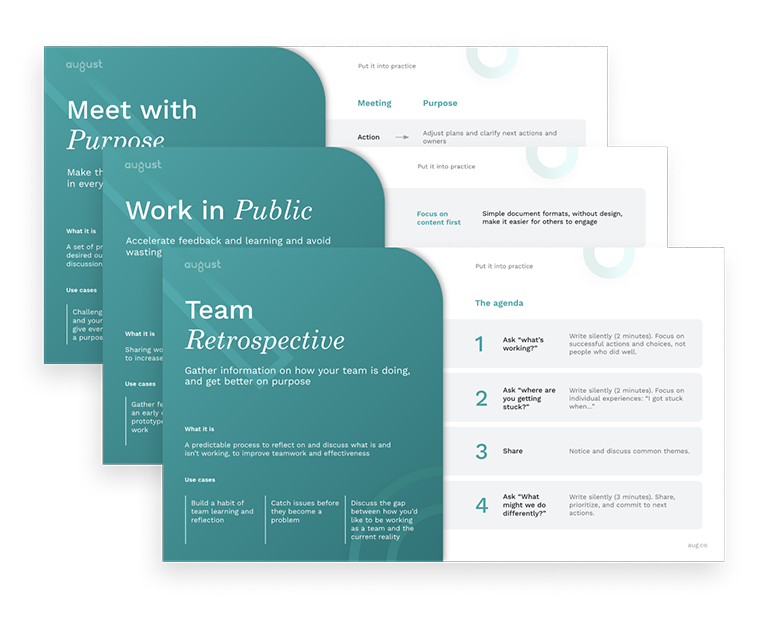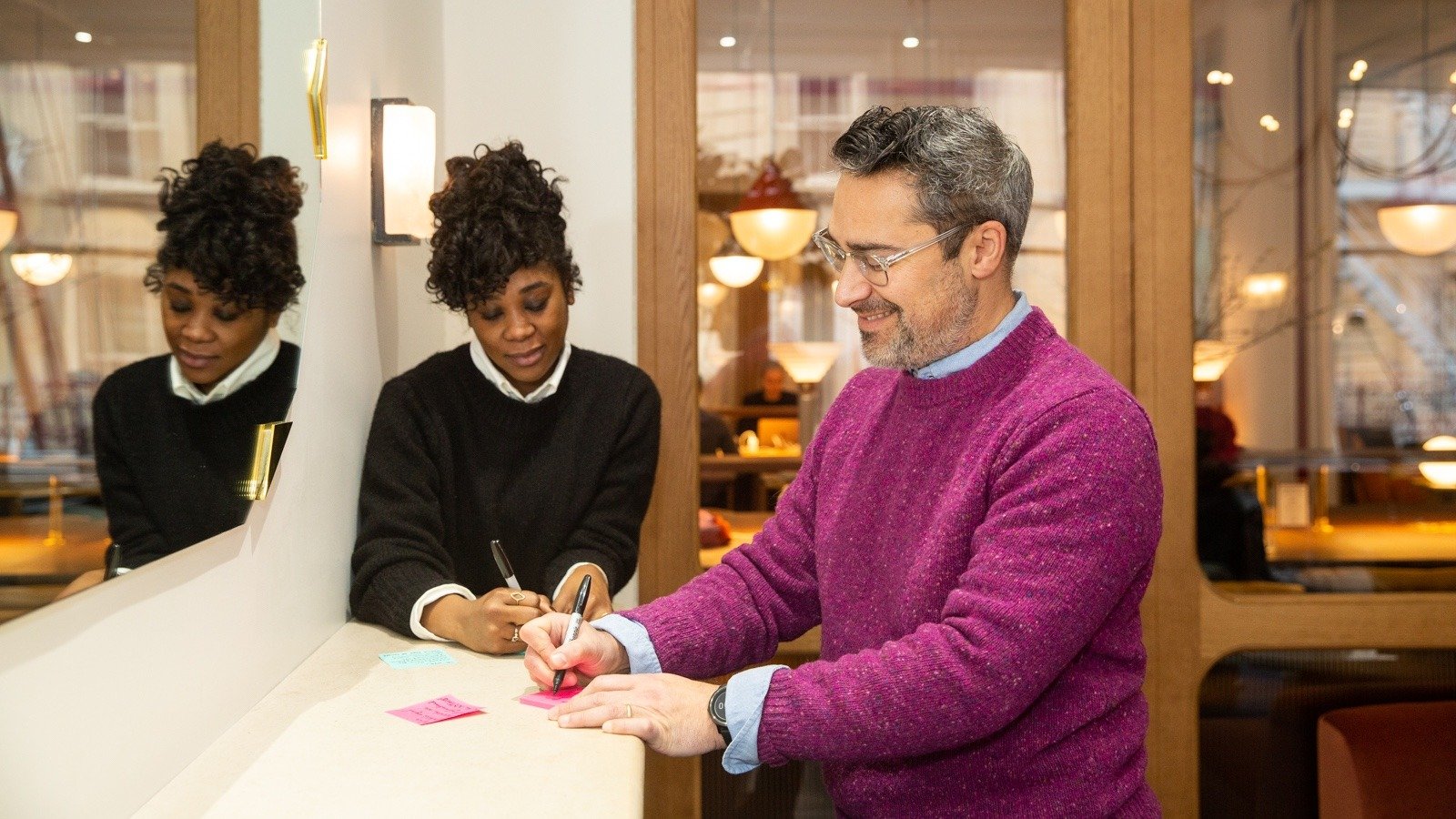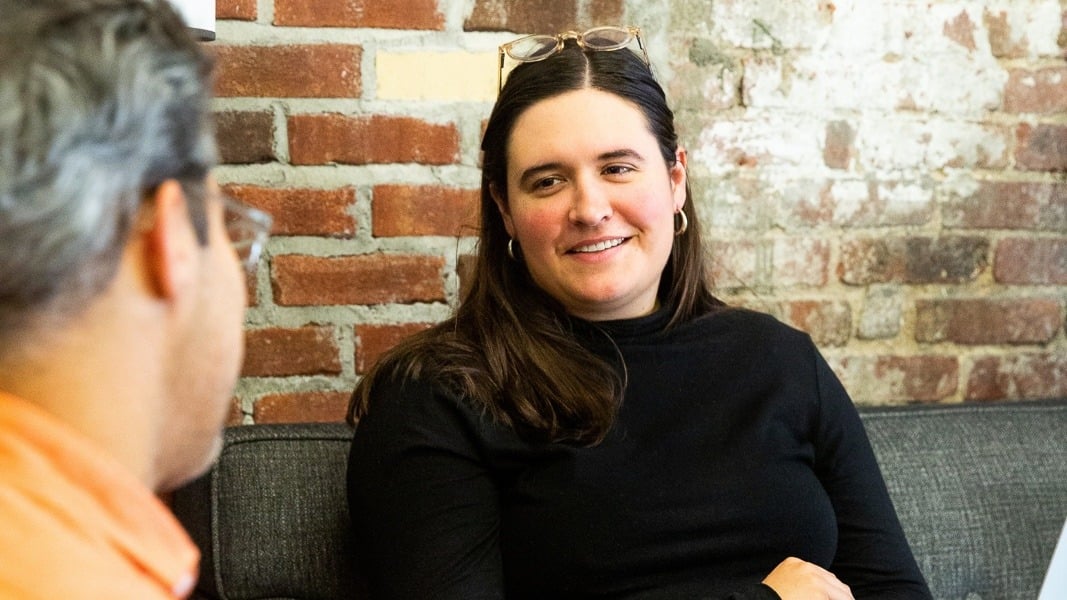Published May 27, 2016 | Updated August 14, 2024 | 18 minute read
Creating a career in responsive organization development and consulting
August has been incredibly fortunate to meet many amazing people who have reached out to us about joining our team. Unfortunately, we are still a young, growing business. And as much as we wish it wasn’t the case, our ability to hire can’t keep up with the volume of awesome people we’re meeting.
For everyone who is as excited and passionate about doing this work as we are, we want to do everything we can to help you find that opportunity. Someday, we hope that our paths will cross again when August is bigger and has more open roles to fill. In the meantime, we hope that this can be a useful guide to help you break into a career helping to build awesome teams and organizations for the world’s most meaningful missions.
- The August Team
What is it that we we do, anyway?
We work with organizations to help them change the way they work and organize to achieve their goals. This work overlaps with the following fields: organization development, organization design, change management, organizational effectiveness, people operations, Kaizen, agile, scrum, lean startup, lean manufacturing, et al.
We are consultants — meaning that we provide clients with an external perspective, combining our own experience and know-how with the unique needs and talents of the client’s own organization.
At August we’re primarily focused on helping large, established global corporations transition from an old way of doing things, to a new better way of doing things. We’re focused on these kinds of clients because we believe (as do others) that they are a powerful lever for accelerating the spread and adoption of this new, better way.
We define this better way of doing things as “responsive” — because it’s about developing an organization’s ability to sense and respond quickly to changes, challenges, and opportunities around them. We believe that there are three key building blocks of responsive organizations:
- Open: the ability to share and process useful information
- Learning: the ability to turn the knowledge you gather into learning and continuous improvement
- Networks: the ability to empower people to contribute no matter who they are or where they are, and to break the limits hierarchy, functional silos, cultural norms, and even the organization itself
As you may guess, this work draws on myriad influences and uses a very diverse set of skills and expertise. This is how we think about the relevant skillsets for our work:
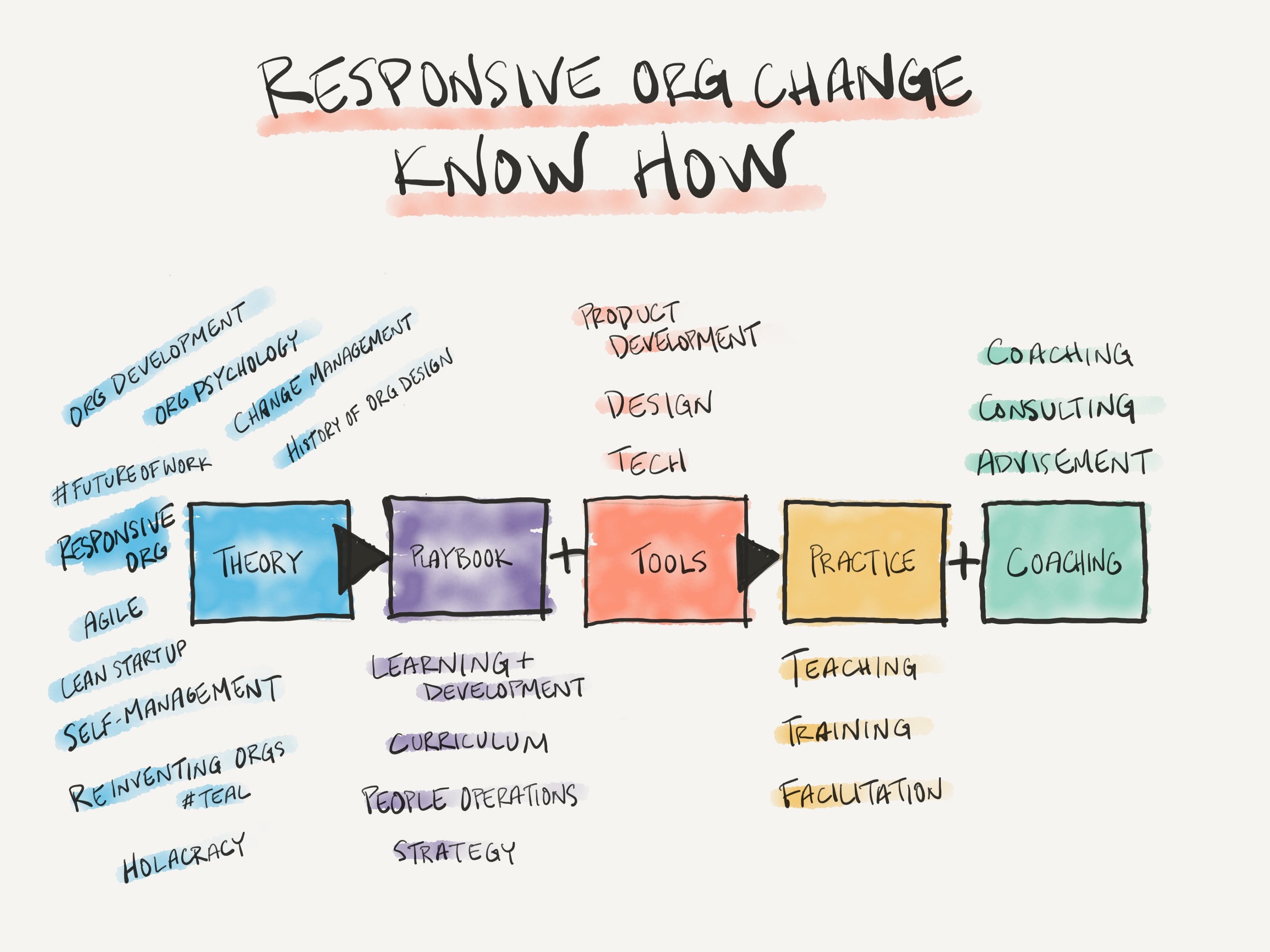
- Theory: the academic, historical, and practical references we take inspiration from
- Playbook: developing content and experiences that help specific people and organizational cultures learn and change
- Tools: harnessing design and technology to create tools — analog and software — that facilitate a new way of working
- Practice: leading people and groups in live settings to help them develop new skills and ways of working
- Coaching: helping people tap into their potential and figure out how to work through the challenges they face as leaders and team members
By far, the best thing you can do to create a career for yourself doing this work is to find and/or create opportunities to learn and — even better — to practice.
Option 1: Start by starting
The best place to start is to find ways to put the theory into practice with whatever team or teams you’re already a part of. There are many different angles to come at this work, and we’d be foolish to try to guess what practices and solutions will be the best fit for you and your team. But, here are a few areas to consider for exploration and experimentation:
- Purpose: help your team get aligned on its reason for being, core values, and/or shared goals
- Action: explore different methods for transparent task management, task ownership, and iterative/agile work rhythms
- Communication: learn and test different approaches to intra-team communication, including software, decision-making, feedback, and conflict-resolution
Option 2: Get experience working in “people ops” inside a responsive company
Most companies who are leading the way in this new way of working have significant, and talented, internal teams who work on these kinds of organizational problems inside their companies.
Investigate the open job opportunities, related to HR, employee engagement, organization development, organization design, learning and development, and people operations at any of these companies (or others):
- Spotify
- Medium
- Tesla
- Github
- Apple
- Netflix
- Amazon
- AirBnB
- Percolate
- Patagonia
- SpaceX
- Xiaomi
- Starbucks
- Buffer
- CultureAmp
- BuzzFeed
- Slack
Option 3: Go to graduate school
While practical real-world experience is essential to getting good at this work, it is also valuable to have a deep academic understanding of the established theory associated with our work. Particularly for our work with large, established corporations, we find it useful to have a working knowledge of what the “normal” or “standard” approaches look like, even as we intentionally challenge and rewrite the rules.
There are many good schools to study this, and some of the fields of study that we have found to be most relevant include (PhD’s and MA’s):
- Organization Development
- Organizational Behavior
- Organizational Psychology
- Social Psychology
- Management Psychology
- Positive Psychology
- Business Administration
- Social Work
- Learning and Organizational Change
- Teaching and Education
Option 4: Get certified
Again, practical real-world experience is essential, but narrowly focused training on particular areas can be a useful and quick way to enhance your skillset. These are some areas of study that are most relevant to our work:
- HR
- Coaching (management/business/executive)
- Holacracy (and self-management, self-organization, etc.)
- Change Management
- Agile and Scrum
- Product Development
Option 5: Teach yourself
It is the 21st century after all, and we do have the internet… so there’s a ton you can learn on your own by just reading, researching, and connecting with others on the web.
Here’s a long (yet, still incomplete) list of things that will lead you down this rabbit hole.
Books
- The Wealth of Networks, by Yochai Benkler
- Work Rules, by Lazlo Bock
- The Second Machine Age, by Erik Brynjolfsson and Andrew McAfee
- Creativity, Inc., by Ed Catmull
- The Visible Hand, by by Alfred D. Chandler Jr.
- Scale and Scope, by Alfred D. Chandler Jr.
- Strategy and Structure, by Alfred D. Chandler Jr.
- The Innovator’s Dilemma, by Clayton M. Christensen
- The Work Revolution, by Julie Clow
- Teaming, by Amy C. Edmondson
- Building the Future, by Amy C. Edmonson
- Switch, by Chip & Dan Heath
- Dealers of Lightning: Xerox PARC, by Michael A. Hiltzik
- Exponential Organizations, by Salim Ismail
- Emergence, by Steven Johnson
- Where Good Ideas Come From, by Steven Johnson
- The Soul of a New Machine, by Tracy Kidder
- Adapt, by Tim Harford
- Reinventing Organizations, by Frederic Laloux
- Conscious Capitalism, by John Mackey and Rajendra Sisodia
- Team of Teams, by General Stanley McChrystal
- Complexity: A Guided Tour, by Melanie Mitchell
- Technological Revolutions and Financial Capital, by Carlota Perez
- The Lean Startup, by Eric Ries
- Holacracy, by Brian J. Robertson
- Lean In, by Sheryl Sandberg
- Becoming Steve Jobs, by Brent Schlender
- How Google Works, by Eric Schmidt
- The Fifth Discipline, by Peter M. Senge
- Unfinished Business, by Anne-Marie Slaughter
- The Everything Store: Jeff Bezos and the Age of Amazon, by Brad Stone
- The Good Jobs Strategy, by Zeynep Ton
- Maverick by Ricardo Semler
Articles, etc.
- Scaling Agile at Spotify
- How Spotify Builds Products
- Valve Handbook
- Gabe Newell on Valve, Interview Part 1 and Interview Part 2 — Washington Post
- Amazon’s 1997 Shareholder Letter
- 2004 Founders’ IPO Letter — Larry Page and Sergey Brin
- Netflix Long Term View
- Netflix Culture Deck and The Woman Behind the Netflix Culture Deck — Patty McCord
- Buurtzorg Practices
- Buffer: Open Salaries
- OKRs: Google’s Internal Grading System, Keys to OKR Success, How To Make OKRs Actually Work at Your Startup, Startup OKRs Template, The Art of the OKR, and How Google Sets Goals (video)
- Holacracy: Governance Meeting Process
- Unlocking the Benefits of Self-Management Without Going All In on Holacracy
- A Beginner’s Guide to Org Design
- Digital Product Design — Speed Up Your Team
- The Lattice Organization — W. L. Gore
- Software is Eating the World — Marc Andreessen
- Customer Development Manifesto, Part 2, Part 3, Part 4, Part 5 — Steve Blank.
- Getting Real — 37 Signals
- Stevey’s Google Platforms Rant — Steve Yegge
- Inside Instagram — Mat Honan
- The Uncanny Valley of the Functional Organization and Why Microsoft’s Reorgnization is a Bad Idea — Ben Thompson
- The 2012 UK Digital Strategy and Audit — Martha Lane-Fox
- The leaked NY Times Innovation Report
- How To Be An Expert — Kathy Sierra
- Zappos is going holacratic: no job titles, no managers, no hierarchy — Amiee Groth for qz.com and UPDATE: Is Holacracy Finally Dead? by Felix Velarde
- How Medium Is Building a New Kind of Company with No Managers — FirstRound Review and UPDATE: Management and Organization at Medium: Moving Beyond Holacracy
- Morning Star’s process for resolving conflict/decision-making
Other resources:
- https://medium.com/21st-century-organizational-development (August’s Medium collection)
- http://firstround.com/review/
- https://rework.withgoogle.com/
- http://toolbox.hyperisland.com/
- https://medium.com/the-ready
- https://medium.com/nature-of-work
- http://www.responsive.org/ (Join the Slack community)
- http://www.reinventingorganizationswiki.com/
- http://www.self-managementinstitute.org/
Other firms who do similar work (in alphabetical order):
- Adaptive Lab (London)
- Business 3.0 (London)
- Digital Migration Partners (Madrid)
- dwarfsandGiants (Vienna)
- IDEO (Multiple offices)
- Incandescent (New York City)
- McChrystal Group (Washington D.C.)
- Nature of Work (New York City)
- Nobl (L.A. and New York City)
- Post*Shift (London)
- Structure & Process (Dresden)
- SYPartners (New York, San Francisco)
- The Ready (New York City)
- Unleash Network (Toronto)
- Vega Factor (New York City)
More advice from leaders at these organizations
“Tell me what inspired your interest in this field. Was it a personal experience? Have you experienced soul-eroding bureaucracy and politics? Have you experienced the joy of turning up for a job that set you on fire, in an organization that fed your dreams? If you could sum it up in one sentence, how do you want other people to feel at work?
The work of designing work is intensely personal. Real people show up in these structures, and the structures we design can help someone make the most of their passion, or can do the opposite. If you want to break into this kind of work, have a point of view on how structures should make people feel. Got it? Awesome. Now test it. Visit companies that are experimenting with structure, interview people who have done this work before, land a job at a company that is asking big questions about how it’s structured and weasel your ideas into a bigger plan. Watch your ideas get tested, learn from it, evolve your point of view.
And as you go on this journey? Share it! Blog, capture, write, record, and publish things you are embarrassed by and proud of. Your enthusiasm and vulnerability will be rewarded. We are always looking for more weird and brilliant people who, despite the evidence, are persistently optimistic that a better world of work exists just beyond what we can imagine today. Welcome friend.” — Alexis Gonzales-Black, IDEO
“Get passionate about the business of business, and approach open-mindedly the question of how different kinds of businesses get results in different circumstances. Learn from the history of how different companies have performed, not just from the inferences that people are making from what seems to be working right now. Go in fear of overgeneralization about how the world is changing. Attend to craft. Break down the different elements of the work you imagine doing — e.g., conducting an interview, diagnosing the root cause of an operational shortfall, navigating difference in strategy in a leadership team meeting — and try to practice each of these elements as deliberately as you can. Learn from people who appear to have mastered craft at these micro levels, valuing those skills above converging too fast on theories or worldviews. Record your failures, which will be frequent — not just failures to achieve something, but failures to anticipate what will occur in circumstances you observe. Consider many possibilities for what went wrong. Don’t converge too fast, but experiment with remedies for the different ways you might have fallen short. Spend time with people who will learn with you as peers, however senior or junior those people may be in the world’s eyes. Constantly use what you partly know to try to achieve the best results in the world you can. See a series on Becoming the Perfect Instrument for a longer meditation on pursuing a calling of any sort… http://onhumanenterprise.com/becoming-perfect-instrument-part-1/” — Niko Canner, Incandescent
“Start reading and obsessing about good work and good organizations. Publicly share what you’re learning, reading, and trying (Medium is good). Engage with others writing or doing work that fascinates, challenges, and/or confuses you. As you get deeper and deeper into your course of reading start taking ideas from these sources into whatever work you currently do right now. Try out some ideas with your current team(s) and share what you’re learning with everyone else. This field is young and there are few gatekeepers. Create new and useful ideas and you’ll find your place within it!” — Sam Spurlin, The Ready
“Read, digest, discuss, and write about as many seminal texts from the org design canon as you can — from yesterday and today. It’s okay, even helpful, to go all the way back and read very early management thinking, as that’s how we got here. Take more recent concepts, methods, and ideas and put them into practice in your own life, however you can. Write about that too. It’ll help you form an authentic POV on whatever you sample. Rather than seeking out people like us (consultants), reach out to people at organizations you admire and ask them to spend a coffee telling you about how they work and organize, what’s working and what isn’t, and who they look up to in this arena. Share what you can, remember what you can’t, with their permission. This is about getting close to your future customer and/or the trail blazers that will inform your future theories and recommendations. If you do the above with determination and consistency, you will almost certainly end up working in the space, and more importantly, contributing to it.” — Aaron Dignan, The Ready
“21st Century organizations are brought to life through software, not the production line. This is a paradigm shift in the truest sense and mostly likely (assuming you received a predominately Western education), requires a similar shift in your own sensing, knowing and meaning making systems. To do this, become aware of your own ‘production line’ ways of thinking and push beyond them. Develop your ability to recognize and understand how systems are fundamentally on-going, entangled, ever-evolving entities. Organizations are living, interconnected systems. So too are humans. Any templated, predefined approach to org change will never do in this world. Meditate on how you can invite change that is emergent, not programmatic. When the whole organizational ‘structure’ can be automated, all that is left are the humans — humans who can now focus on solving higher-order challenges. For this we need new people ops — new social relations, new intelligences, and a new understanding of self-and-other as interconnected and co-evolving. Have a POV on how humans change and transform. This is fundamental to the practice of ethical organization design and development. Learn to connect the mechanisms of an organizational system to the deep, (inter)personal human mechanisms that enliven them. Learn to consider how the micro gives way to the macro and vice versa. Notice it in how you speak, listen, and ask questions. Learn to consider all these moving parts at once, in ever-evolving relation. Notice how nothing is static. These are the systems dynamics we need to get better at materializing in, through, and as our organizations. This is the paradigm of the digital, networked world. This is how you can make and impact.” — Dara Blumenthal, Nature of Work
“Thinking out loud by sharing links you find interesting is a good start, and then blogging about the case studies, theory or articles that resonate with you, is still a great way to establish your own POV on the topic and perhaps also to find fellow travellers or catch the eye of firms that might be hiring. Yes, read some books on the topic, but also read some history. In many ways, the 20th century corporate models we are trying to change were an historical anomaly and the conduct of business was much more networked and personal for a thousand years previously. Also read along the seams between disciplines: business/sociology/anthropology/psychology/technology/etc. If possible, take an internship in a traditional corporate so that you can feel and smell the byzantine process-driven world their employees are required to live in. This will give you empathy, understanding and a desire to make things better. And don’t forget … the theory is the easy bit. There is no shortage of one-person-firms, self-appointed gurus and highly opinionated writers on the internet, but what really counts is our practical ability to do the work on the ground, and that is often slow, frustrating and challenging.” — Lee Bryant, Post*Shift
If you care about making the future of work more human and changing the way organizations operate, subscribe to our weekly newsletter and get in touch.

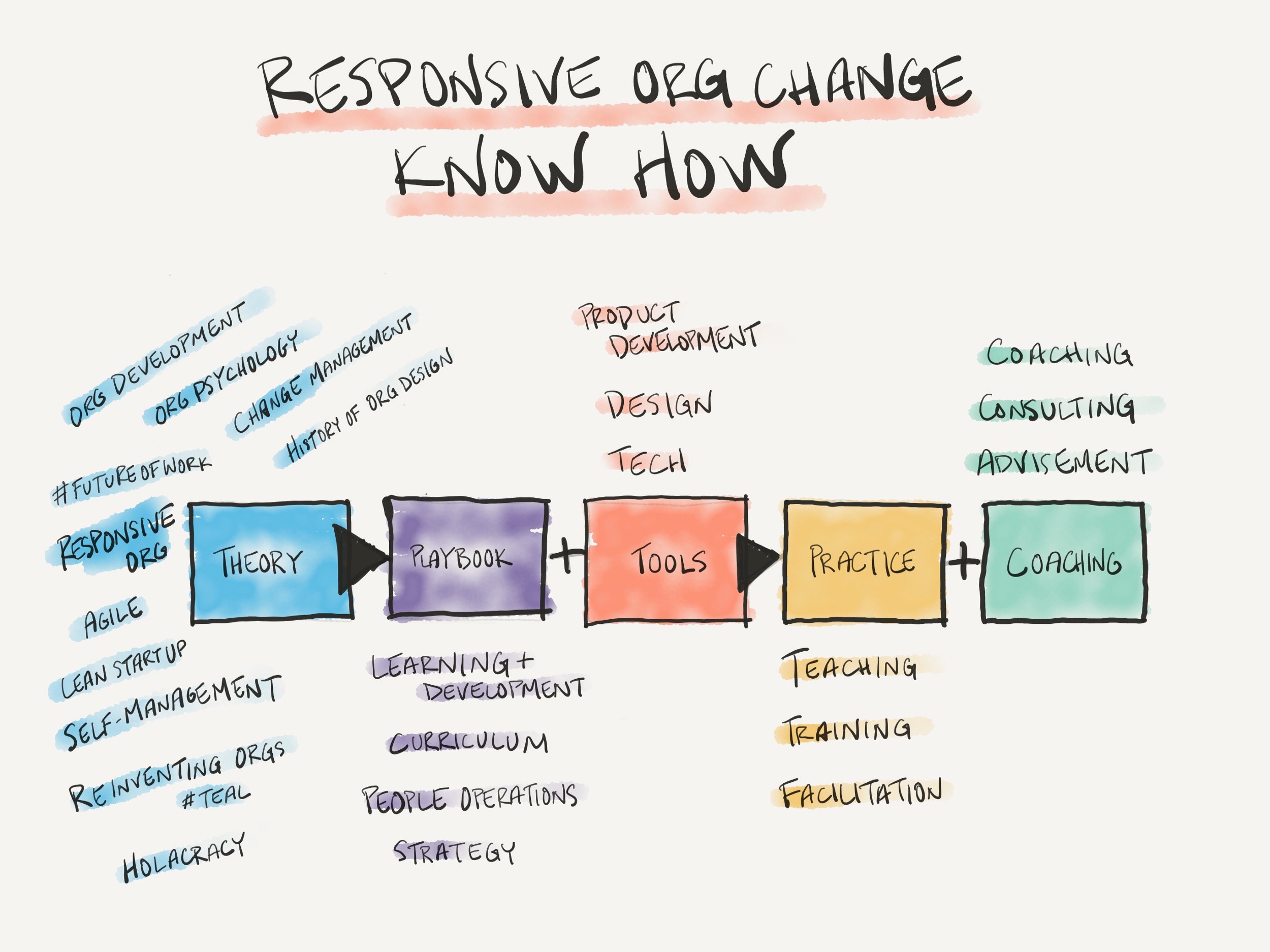
.jpg)


